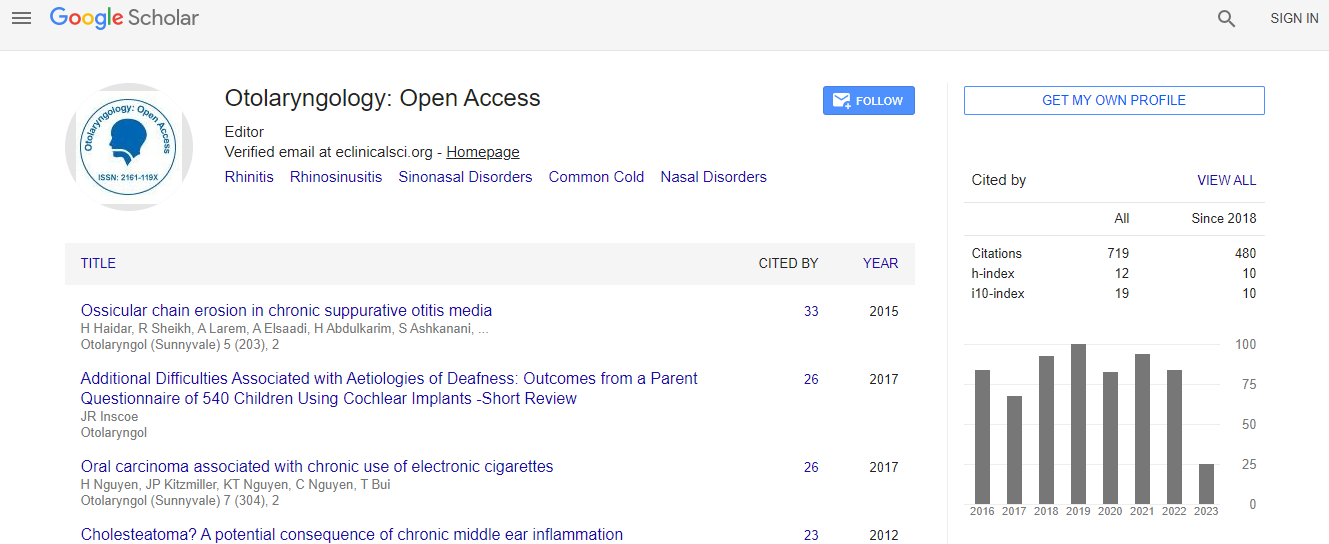Our Group organises 3000+ Global Conferenceseries Events every year across USA, Europe & Asia with support from 1000 more scientific Societies and Publishes 700+ Open Access Journals which contains over 50000 eminent personalities, reputed scientists as editorial board members.
Open Access Journals gaining more Readers and Citations
700 Journals and 15,000,000 Readers Each Journal is getting 25,000+ Readers
Google Scholar citation report
Citations : 925
Otolaryngology: Open Access received 925 citations as per Google Scholar report
Otolaryngology: Open Access peer review process verified at publons
Indexed In
- Index Copernicus
- Google Scholar
- Sherpa Romeo
- Open J Gate
- Genamics JournalSeek
- RefSeek
- Hamdard University
- EBSCO A-Z
- OCLC- WorldCat
- Publons
- Geneva Foundation for Medical Education and Research
- ICMJE
Useful Links
Recommended Journals
Related Subjects
Share This Page
Taste and smell dysfunction in the United States: The role of otolaryngologists
International Conference and Exhibition on Otolaryngology
Robert I. Henkin
ScientificTracks Abstracts: Otolaryngology
Abstract
Taste and smell dysfunction are common clinical problems inhibiting quality of life in millions of patients in the U.S. These symptoms usually relate to chronic disease processes which initiate loss and distortion of taste and smell. These diseases include hormonal, metabolic, hematological, neurological, trace metal and nutritional processes. Normally these processes provide growth factors to stimulate stem cells in taste buds and olfactory epithelium. These growth factors are secreted by parotid glands into saliva to generate taste buds and by serous glands into nasal mucus to generate olfactory epithelium. Stem cells, under the influence of these growth factors, generate taste bud and olfactory receptors by which taste and smell function normally occurs. Any pathology which inhibits growth factor secretions causes loss and distortion of taste and smell. Most otolaryngologists consider these symptoms related to oral or nasal pathology but biochemical inhibition of growth factor secretion is the major culprit. Since otolaryngologists are the major physician group to whom patients with these symptoms turn for help understanding generation of these symptoms and their correction is critical. However, methods to accomplish this understanding are not commonly available. We developed systems to assist otolaryngologists to evaluate and treat patients with these symptoms. These systems involve (1) psychophysical techniques to measure taste and smell function, (2) biochemical techniques to collect and measure growth factors in saliva and nasal mucus and (3) therapeutic methods to correct these dysfunctions. Drugs which increase these growth factor secretions have successfully corrected these symptoms in over 50% of patients.Biography
Dr. Robert I. Henkin received his Ph.D. in 1956 and his M.D. in 1959 both from UCLA. After completing residency in Medicine and Neurology he was a research associate at NIH, Bethesda, MD, in 1961, Section Chief in Neuroendocrinology at NIH in 1965, professor of Neurology at Georgetown University Medical Center in 1975 and Director of the Center for Molecular Nutrition and Sensory Disorders in Washington, DC in 1985. He is now Director of The Taste and Smell Clinic, the first private program dedicated to evaluation and treatment of patients with taste and smell dysfunction.

 Spanish
Spanish  Chinese
Chinese  Russian
Russian  German
German  French
French  Japanese
Japanese  Portuguese
Portuguese  Hindi
Hindi 
